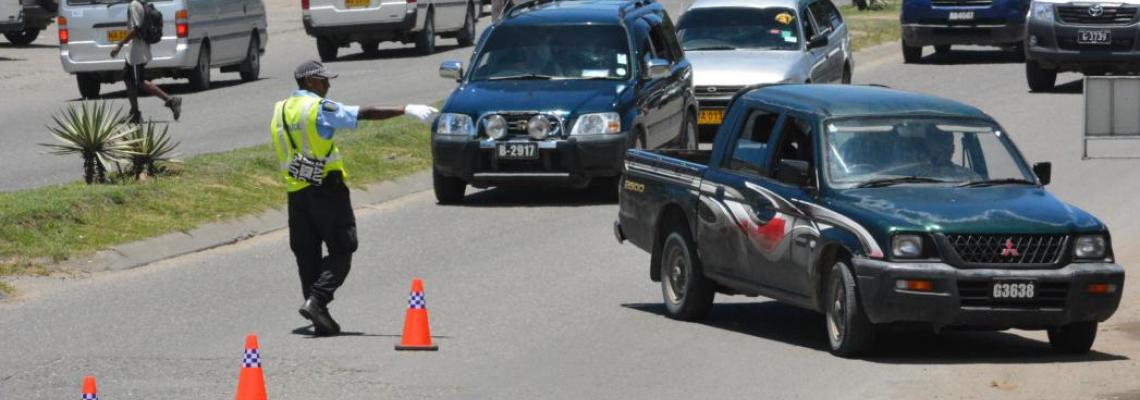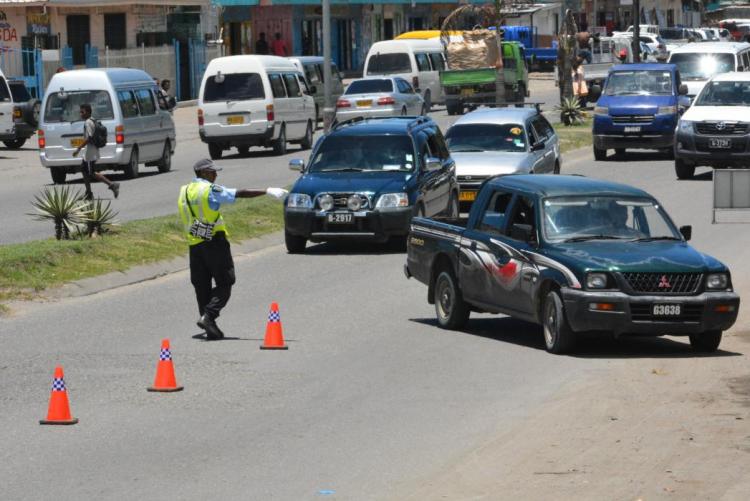The Traffic Department of the Royal Solomon Islands Police (RSIPF) is responsible for Traffic Policing in Honiara. The department also relies on General Duties police and provincial police to support public safety on roads in the Solomon Islands.
Road Safety
The RSIPF works in partnership with other agencies including the Honiara City Council and the Internal Revenue Division to achieve this goal.
In addition to the information below, please see the following awareness brochures related to Traffic and Road Safety;
- Driving and Alcohol
- Alcohol testing of drivers
Road safety in the Solomon Islands is impacted by a number of factors; most are in common with other countries, but some are impacted more by Solomon Islands conditions, including the state of roads, compliance to wearing of seatbelts, road-worthiness of vehicles, drink driving and complacency about vehicle overloading.
The RSIPF and partners regularly conduct targeted traffic operations in order to educate the public, drivers and passengers of some of the dangers faced when the above issues are disregarded, or when legal requirements are not met. Targeted operations are conducted on a range of issues including:
- Unlicensed vehicles
- Unlicensed drivers
- Drink driving
- Speeding
- Vehicles with defective tires, breaks, poor lights or other issues which make the vehicle un-roadworthy
- Unidentified number plates
- Vehicle playing loud music
- Vehicles parking illegally
- Vehicles with excessive loads or passengers.
Some operations are conducted in partnership with the Honiara City Council Law Enforcement Division to check on Business licenses of buses and taxis that are providing public transportation services throughout the city.
Speeding
Speeding is a major contributing factor in many road accidents. Drivers must drive at a speed to suit the conditions. You should travel at a lower speed in bad weather, after dark, in heavy traffic, on unfamiliar road, winding or narrow road. In areas with pedestrians, including near schools, please SLOW DOWN.
REMEMBER TO CHOOSE A SAFE SPEED FOR THE DRIVING CONDITION
You are more likely to crash if you exceed the speed limits or drive at a speed that is not appropriate for the condition. As the vehicle speed increases, you have less time to react to emergencies and it takes a greater distance to stop. Other road users also find it more difficult to judge how fast you are travelling.
A person who causes the death of another person by the driving of a motor vehicle on a road recklessly, or at speed or in a manner which is dangerous to the public can be sentenced to imprisonment for five years. You can also be charged with exceeding the prescribed speed and face a $700 fine or six months imprisonment.
Drink Driving
Driving under the influence of liquor or drugs in an offence under the Traffic Act.
Alcohol will:
- reduce your ability to do more than one thing at a time
- make it more difficult to concentrate on driving
- slow down your reaction times (such as braking for another vehicle or a child on the road)
- make you over-confident and more likely to speed and take risks
- make simple tasks more difficult
- reduce your ability to hear and see clearly
- makes you more likely to fall asleep behind the wheel / whilst driving.
The Police have the power to:
- stop and detain any vehicle and driver to test for alcohol impairment
- arrest a driver or person in charge of a motor vehicle who is suspected of being unfit to drive as a result of alcohol or drugs
- impound the vehicle.
Never get into a vehicle when you know the driver is impaired by alcohol or drugs. If you do, you are taking your own life into your hands. Think ahead and if you are planning to drink alcohol then DON’T drive. Make other arrangements. See the attached brochure for more tips.
Overloading and unsafe loading of vehicles
It is very common in the Solomon Islands to see overloading on vehicles, including passengers riding in the tray of vehicles. Whilst the RSIPF appreciate this is a common practice, the public needs to be aware of the dangers and the driver is responsible for the safety of passengers. Under the Traffic Act, no vehicle shall be used on a road if it is loaded in such a manner as to make it a danger to other persons using the road or to persons travelling on the vehicle. RSIPF have responded to a number of recent instances where persons have been killed when vehicles have lost control and either the load has fallen off and killed persons or the passengers on the rear of the vehicle had been thrown off and killed.
Unrestrained drivers and passengers
Seatbelts are a proven aid in reducing road deaths and trauma. When you are driving, or when you are a passenger in a vehicle, always wear your seatbelt. If you have children in the vehicle, always sit them in the back seat, wearing a seatbelt. Do not put children on your lap in the front of a vehicle, and do not put the child on your lap and share a seatbelt as this can cause the child serious injury in an accident. Children should never be allowed to travel in the tray of a vehicle.
Unlicensed drivers
All persons who drive a vehicle must have the valid licence. It also must be of the correct class for the vehicle being driven. Do not drive a vehicle if you don’t have a driving licence as it is an offence under the Traffic Act, and unlicensed drivers often lack the skill and experience to safely operate a motor vehicle. Never get into a vehicle when you know the driver is not licenced. Unregistered vehicles If you own a vehicle it is you’re responsibility to register your vehicle before it is being driven on any public road. Under the Traffic Act it is an offence to drive unregistered motor vehicle so be responsible and play your part. Information on licencing and renewal can be found at the Internal Revenue Division website. You can also view the Road Transport Act.
ROAD SAFETY TIPS
- Drive to the conditions and speed restrictions
- If you are going to drink, don't drive. If you are going to drive, don't drink.
- Do not take drugs that will impair your ability to operate a vehicle.
- Never get in to a vehicle if the driver is affected with alcohol.
- Ensure that you and your vehicle are licenced.
- Ensure that your vehicle is not overloaded and passengers are safe
- Properly restrain children.
Your cooperation and assistance will help you and the police force to maintain law and order on the road.


